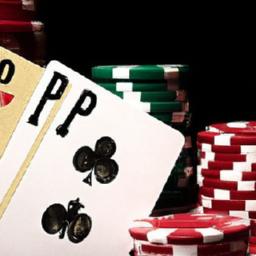In the dim light of smoky back rooms and the glimmer of casino lights, poker gambling has captured hearts and minds for generations. With its roots tracing back to the early 19th century, poker isn’t merely a game of chance; it’s a complex tapestry woven with skill, psychology, and strategy. Players gather around tables, driven not only by the thrill of winning but also by the camaraderie and fierce competition that the game fosters. From the iconic “All-In” moment to the nail-biting anticipation of the river card, poker encapsulates a rich narrative of risk and reward. In this exploration of poker gambling, we delve into the mechanics of the game, the culture that surrounds it, and the allure that keeps players returning to the felt, eager to test their wits and fortunes against one another. Whether you’re a seasoned pro or a curious novice, understanding the nuances of poker invites you into a world where every hand tells a story and every decision could lead to glory—or disaster.
Table of Contents
- Exploring the Psychology Behind Poker Gambling Strategies
- The Importance of Bankroll Management for Sustained Success
- Understanding the Role of Reads and Tells in Poker Dynamics
- Tips for Choosing the Right Poker Variants for Your Style of Play
- Q&A
- The Conclusion

Exploring the Psychology Behind Poker Gambling Strategies
Delving into the psychological aspects of poker gambling reveals that a player’s mindset can significantly impact their strategy and overall success at the table. Understanding one’s own emotions and those of opponents is crucial in this high-stakes game. Players often employ various cognitive strategies to maintain focus and assess risk, including:
- Emotional Control: Managing anxiety and excitement to make rational decisions.
- Bluffing Psychology: Mastering the art of deception and reading opponents’ reactions.
- Decision-Making Processes: Weighing probabilities against potential payoffs.
Moreover, players often fall into certain behavioral patterns that can define their gameplay. Recognizing these traits helps refine their approach. To illustrate, consider the following common play styles and their psychological underpinnings:
| Play Style | Psychological Trait |
|---|---|
| Aggressive | High risk tolerance, confidence in decision-making. |
| Passive | Fear of loss, tendency to avoid confrontation. |
| Balanced | Strategic awareness, adaptability. |
Understanding these dimensions can empower players to refine their strategies and enhance their chances of success in the world of poker gambling. For further insights into poker strategies and psychology, visit www.betreward.com.

The Importance of Bankroll Management for Sustained Success
Effective management of your bankroll is crucial for anyone looking to thrive in the competitive world of poker gambling. It involves maintaining a clear separation between your poker funds and personal finances, thus ensuring that you can play without the stress of financial instability. Setting limits on how much you are willing to wager is one of the essential strategies. This not only helps in minimizing losses but also allows you to play more strategically. Players should consider the following key aspects of bankroll management:
- Establishing a Dedicated Poker Fund: Allocate specific money for poker activities.
- Choosing the Right Game Limits: Opt for stakes that align with your bankroll size.
- Risk Assessment: Evaluate the potential risks associated with different poker formats.
- Regularly Reviewing Your Bankroll: Keep track of your wins and losses to adjust strategies accordingly.
Additionally, employing a disciplined approach with incremental betting can extend your playtime and enhance your chances of success. It’s wise to embrace an adaptable strategy, allowing room for adjustments based on performance and changing circumstances in the poker scene. Below is a simplistic guide that highlights the balance between bankroll size and buy-in amounts:
| Bankroll Size | Recommended Buy-in Amount |
|---|---|
| $100 | $1 – $5 |
| $500 | $5 - $25 |
| $1,000 | $25 – $50 |
By adhering to these principles of bankroll management, you not only protect your investment but also cultivate a mindset that promotes longevity in your poker journey. Remember, successful players are often those who master the art of managing their resources effectively, allowing them to ride out the inevitable ups and downs of the game. For further insights and strategies, you can visit www.betreward.com.

Understanding the Role of Reads and Tells in Poker Dynamics
In the high-stakes world of poker, mastering the art of reading your opponents is just as crucial as understanding the game mechanics. This involves not only observing their actions but also interpreting their emotions and physical cues, often referred to as tells. A well-timed blink, a fidget, or a confident posture can offer insights into the strength of their hands. Players often exhibit involuntary responses when they have a strong or weak hand, and being able to decipher these signals can be the difference between winning and losing. Some common tells include:
- Body Language: Body orientation, eye contact, and overall demeanor.
- Betting Patterns: Inconsistencies in the timing and amount of bets.
- Verbal Cues: Changes in tone or speech speed can indicate nervousness or confidence.
Conversely, skilled players are often adept at concealing their tells while simultaneously trying to project misleading signals. This creates a fascinating layer of psychological warfare, where players must balance being genuine with trickery. Practicing self-control and understanding how to manipulate your own portrayal is essential. Consider the following strategic elements for maintaining an effective poker face:
| Strategy | Description |
|---|---|
| Control Facial Expressions | Maintain a neutral expression regardless of card strength. |
| Consistent Betting | Vary bet sizes deliberately to confuse opponents. |
| Adaptive Behavior | Observe opponents’ reactions to develop counter-tells. |
Ultimately, success in poker isn’t merely about the hand you’re dealt, but rather how well you can read and respond to the ever-evolving dynamics at the table. To delve deeper into strategies and enhance your game, visit www.betreward.com.

Tips for Choosing the Right Poker Variants for Your Style of Play
Finding the perfect poker variant that aligns with your style of play is crucial for enhancing both your enjoyment and effectiveness at the tables. Each variant offers distinct strategies, rules, and levels of complexity, allowing you to express your personality and skill set in various ways. Consider the following aspects when selecting your game:
- Your experience level: Beginners may gravitate towards simpler games like Texas Hold’em, while seasoned players might enjoy the intricacies of Omaha or Seven-Card Stud.
- Your risk tolerance: If you prefer a more conservative approach, low-stakes games or variants with lower volatility can provide a steadier experience.
- Time commitment: Some variants, such as Razz, can take longer to play, so assess how much time you’re willing to invest.
- Social interaction: If you enjoy the camaraderie of a social game, consider variants like Pineapple, which often foster a more relaxed atmosphere.
To help you narrow down your choices further, the following table summarizes popular poker variants along with their key characteristics:
| Variant | Complexity Level | Player Interaction | Time to Learn |
|---|---|---|---|
| Texas Hold’em | Low | Moderate | Short |
| Omaha | Medium | High | Medium |
| Seven-Card Stud | Medium | Moderate | Medium |
| Razz | Medium | Low | Medium |
Exploring these variants can reveal much about your preferences and playing style. Check out resources like www.betreward.com for further insights into which game might be the best fit for your poker journey.
Q&A
Q&A: Understanding Poker Gambling
Q1: What is poker gambling?
A1: Poker gambling refers to the act of playing poker with real money at stake. Players compete in various forms of poker, like Texas Hold’em or Omaha, using their skills, strategy, and a bit of luck to win chips that have monetary value. It’s a blend of psychology, probability, and skill that makes it both thrilling and complex.
Q2: How has poker gambling evolved over the years?
A2: Poker gambling has undergone a significant transformation since its inception. From informal home games to high-stakes tournaments like the World Series of Poker (WSOP), it has grown into a global phenomenon. The online poker boom in the early 2000s revolutionized the landscape, allowing players to engage from their homes, leading to enhanced strategies and a broader player community.
Q3: What are the various forms of poker gambling?
A3: Poker gambling encompasses a variety of formats, from cash games to tournaments. Some popular types include Texas Hold’em, Omaha, Seven Card Stud, and Razz. Each variant has unique rules and strategies, catering to different player preferences and skill levels, ensuring there’s something for everyone.
Q4: Is poker gambling purely a game of chance?
A4: While luck plays a role in poker, it’s predominantly a game of skill. Players must understand probabilities, manage their bankroll, and read opponents’ behavior. Skilled players can consistently make better decisions than novices, increasing their chances of winning in the long run.
Q5: What are the risks associated with poker gambling?
A5: Like all forms of gambling, poker carries risks, primarily the potential for financial loss. It can also lead to addictive behaviors if not approached with caution. Responsible gambling practices, such as setting limits and recognizing when to walk away, are crucial for minimizing these risks and enjoying the game safely.
Q6: How do players develop their skills in poker?
A6: Players improve their poker skills through a mix of study, practice, and experience. This might involve reading books, watching instructional videos, participating in online forums, or playing both online and in-person games. Analyzing past hands and learning from mistakes are vital for honing strategies and gaining a competitive edge.
Q7: What role does psychology play in poker gambling?
A7: Psychology is a key element of poker gambling. Players often engage in “bluffing,” a strategy that involves misleading opponents about the strength of their hand. Understanding opponents’ behaviors, recognizing tells, and managing one’s own emotional responses during high-pressure situations can significantly influence the outcome of a game.
Q8: Are there legal considerations regarding poker gambling?
A8: Yes, poker gambling is subject to varying laws based on jurisdiction. Some areas embrace poker and regulate it, while others consider it illegal. Always check local laws and regulations before participating in either live or online poker to ensure compliance and avoid potential legal issues.
Q9: What are the social aspects of poker gambling?
A9: Beyond the monetary aspect, poker gambling can foster community and camaraderie. Tournaments can bring players together from diverse backgrounds, creating opportunities for social interaction. Whether playing casually with friends or competing in larger events, the shared experience of poker often cultivates friendships and memorable moments.
Q10: How can one approach poker gambling responsibly?
A10: Responsible poker gambling begins with setting clear limits for time and money, understanding the odds, and treating losses as a natural part of the game. It’s important to play for enjoyment rather than as a source of income and to seek help if gambling becomes problematic. Recognizing the warning signs of gambling addiction is essential to maintaining a healthy relationship with the game.
The Conclusion
As we shuffle the final deck and pause for one last hand, it’s vital to reflect on the intricate dance that is poker gambling. Beyond the chips and cards lies a world rich in strategy, psychology, and the ever-present thrill of chance. Whether you’re a seasoned pro or just starting to navigate the felt, understanding the nuances of poker can greatly enhance both your gameplay and your enjoyment.
Remember, the essence of poker transcends winning or losing; it lies within the stories each hand tells and the connections forged around the table. As you venture forth into the exhilarating realm of poker, may you carry with you the skills you’ve honed, the lessons learned, and the camaraderie shared with fellow players. Like any game, it’s not just about the outcome—but the journey, the friends made, and the unforgettable moments created along the way. So, place your bets wisely, keep your poker face strong, and enjoy the unpredictable ride that poker gambling offers. The next chapter in your poker saga awaits—are you ready to draw your cards?